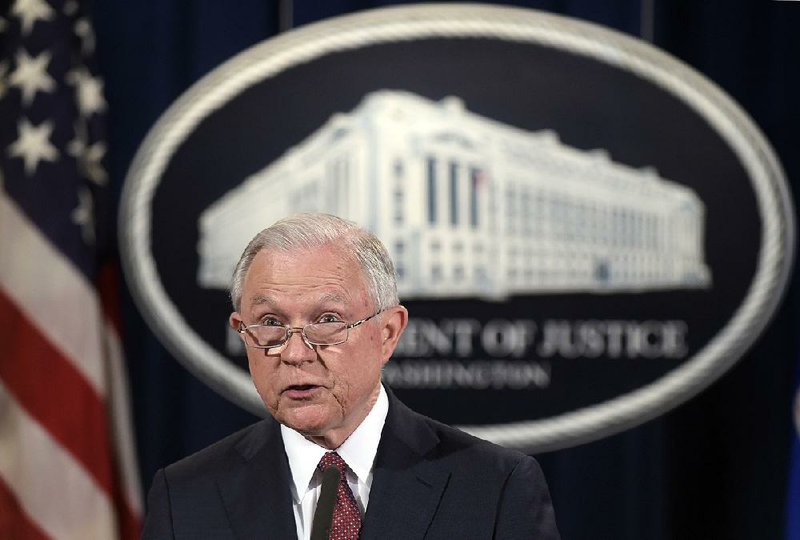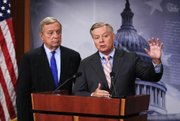WASHINGTON -- President Donald Trump announced Tuesday that his administration would end an Obama-era program that allowed young illegal immigrants to live in the country without fear of deportation, calling the program unconstitutional and challenging Congress to address the issue.
Trump's decision, coming after weeks of deliberations with aides, sparked fears among activists that nearly 800,000 immigrants who have lived illegally in the United States since they were children would be subject to removal once their government-issued work permits expire under the Deferred Action for Childhood Arrivals program, frequently called DACA.
The president and his top advisers said they had no choice but to end the program, framing it as an abuse of executive power from President Barack Obama that was unlikely to survive a legal challenge. They called on lawmakers to determine the future of the program's participants, known as "dreamers," and emphasized that no work permits would be revoked for at least six months to give Congress time to act.
On Twitter, Trump wrote Tuesday night: "Congress now has 6 months to legalize DACA (something the Obama Administration was unable to do). If they can't, I will revisit this issue!"
[U.S. immigration: Data visualization of selected immigration statistics, U.S. border map]
In unveiling his decision to phase out the program, Trump did not make public remarks, deferring to Attorney General Jeff Sessions to make the announcement at the Justice Department. He did, however, respond briefly to reporters' shouted questions at an unrelated White House event.
"I have a love for these people and, hopefully, now Congress will be able to help them and do it properly," Trump said, referring to the dreamers.
"And I can tell you," he added, "speaking to members of Congress, they want to be able to do something and do it right. And really we have no choice. We have to be able to do something, and I think it's going to work out very well, and long term it's going to be the right solution."
In a written statement, Trump asserted that Obama made "an end-run around Congress" that violated "the core tenets that sustain our Republic." He added that there can be "no path to principled immigration reform if the executive branch is able to rewrite or nullify federal laws at will."
A wide array of politicians, civic leaders and business executives spoke out against Trump's move, including Facebook founder Mark Zuckerberg and representatives of the Mexican government and the Catholic Charities of New York. Some Democrats, including New York Attorney General Eric Schneiderman, vowed to pursue legal action to protect the dreamers.
In a lengthy post on his Facebook page, Obama called Trump's move "cruel" and said it represented a "political decision" to a "moral question."
"Ultimately," Obama wrote, "this is about basic decency. This is about whether we are a people who kick hopeful young strivers out of America, or whether we treat them the way we'd want our own kids to be treated. It's about who we are as a people -- and who we want to be."
PRIORITIES UNCHANGED
[PRESIDENT TRUMP: Timeline, appointments, executive orders + guide to actions in first 200 days]
Senior officials at the Department of Homeland Security said the agency would no longer accept new applications for the deferred-action program other than those submitted before Tuesday.
Immigrants enrolled in the program will be permitted to continue until their two-year work permits expire. And those whose permits expire through March 5 are allowed to seek renewals provided they do so by Oct. 5, officials said.
If Congress fails to act, dreamers would not be high deportation priorities, Department of Homeland Security officials said, but would be issued notices to appear at immigration court if they are encountered by federal immigration officers. There are no plans for the department to use personal information, including home addresses, of dreamers who registered for work permits to aid in deportation operations unless there is an immediate concern over national security, officials said.
"Our enforcement priorities remain unchanged," Trump said in his statement. "We are focused on criminals, security threats, recent border-crossers, visa overstays, and repeat violators. I have advised the Department of Homeland Security that DACA recipients are not enforcement priorities unless they are criminals, are involved in criminal activity, or are members of a gang."
Although Trump's announcement had been anticipated in recent days, it still left young people covered by the deferred-action program devastated.
"You just feel like you are empty," said a sobbing Paola Martinez, 23, who came to the U.S. from Colombia and recently graduated with a civil engineering degree from Florida International University.
Karen Marin, an immigrant from Mexico, who was in a physics class at Bronx Community College in New York when the news broke, said: "I honestly can't even process it right now. I'm still trying to get myself together."
Congressional leaders from both parties said the time was right to pursue a legislative solution for the dreamers, but they did not lay out a clear path on an issue that has vexed lawmakers since President Ronald Reagan signed the last major comprehensive immigration bill in 1986.
The Development, Relief, and Education for Alien Minors Act, or DREAM Act, which would have offered a path to citizenship to dreamers, failed narrowly in the Senate in 2010 after passing in the House.
House Speaker Paul Ryan, R-Wis., who last week urged Trump not to end the program until Congress acted, called the deferred-action program a "clear abuse of executive authority" by Obama.
"It is my hope that the House and Senate, with the president's leadership, will be able to find consensus on a permanent legislative solution that includes ensuring that those who have done nothing wrong can still contribute as a valued part of this great country," Ryan said.
STATES' LEGAL THREAT
Trump had equivocated for months as pressure mounted among immigration hawks to fulfill a campaign promise to end the deferred-action program. He had vowed to show "great heart" in his decision and declared that dreamers could "rest easy."
But a threat from Texas and several other states, including Arkansas, to sue the administration if it did not end the program by Tuesday forced Trump to make a decision. Several senior aides, including Sessions, who declared that the Justice Department would be unable to defend the program in court, lobbied the president to end the program. Others, including Chief of Staff John Kelly, the former homeland security secretary, cautioned that terminating the program would cause chaos for young immigrants who enjoy broad popular support.
The Obama administration had defended the creation of the 2012 program by citing the precedent of "prosecutorial discretion" in which law enforcement agencies with limited resources set priorities to fulfill their obligations. With more than 11 million people in the country illegally, the government had the ability to deport only a small fraction each year, Obama aides said at the time.
Sessions wrote a memo Monday concluding that the deferred-action program is unconstitutional, prompting acting Homeland Security Secretary Elaine Duke to issue the order Tuesday to rescind the 2012 Obama administration memo by Janet Napolitano, then the secretary of homeland security, officials said.
In his remarks, Sessions said Obama "sought to achieve specifically what the legislative branch refused to do" and that "the Department of Justice cannot defend this overreach."
Texas Attorney General Ken Paxton applauded Trump's decision, saying the program "went far beyond the executive branch's legitimate authority." Paxton said that as a result of Trump's decision, the states would lift their threat of legal action.
The fight over the dreamers now shifts to Congress, where several new proposals have been put forward. Those include the Bridge Act, a bipartisan bill with 25 co-sponsors that would extend the program's protections for three years to give Congress time to enact permanent legislation.
In his statement, Trump expressed support for the Reforming American Immigration for a Strong Economy Act, a proposal from conservative Sens. Tom Cotton, R-Ark., and David Perdue, R-Ga., to slash legal immigration levels by half over a decade.
"We will resolve the DACA issue with heart and compassion -- but through the lawful democratic process," Trump said, "while at the same time ensuring that any immigration reform we adopt provides enduring benefits for the American citizens we were elected to serve."
PROGRAM SUPPORTERS
Supporters of the program expressed skepticism that an administration that has taken a hard line on immigration would exercise restraint with dreamers once the work permits begin to expire.
More than 300 immigration activists protested in front of the White House, calling Trump a "liar" and a "monster," and more than two dozen demonstrators were reportedly arrested outside Trump Tower in New York.
Javier Palomarez, president of the U.S. Hispanic Chamber of Commerce, resigned from Trump's presidential diversity committee over what he called a "disgraceful action."
In a tweet, former Vice President Joe Biden wrote: "Brought by parents, these children had no choice in coming here. Now they'll be sent to countries they've never known. Cruel. Not America."
House Minority Leader Nancy Pelosi, D-Calif., sent out a fundraising pitch to Democratic supporters, calling the decision "quite possibly the cruelest thing President Trump has ever done" -- prompting White House spokesman Sarah Huckabee Sanders to counter that Pelosi's fundraising was the "most heartless" act of the day.
Companies from a variety of industries, including technology, finance and autos, swiftly condemned the Trump administration's decision.
"This is a sad day for our country," Facebook's Zuckerberg wrote on the social media service.
Some businesses underscored the economic contributions made by children of illegal aliens. Some of those businesses called on Congress to pass new legislation while others threatened legal action.
"Wells Fargo believes young, undocumented immigrants brought to America as children should have the opportunity to stay," spokesman Jennifer Dunn wrote in an email. "DACA is relevant to our team members and the communities we serve."
Information for this article was contributed by David Nakamura of The Washington Post; by Jill Colvin, Sadie Gurman, Ken Thomas, Erica Werner, Richard Lardner, Adriana Gomez Licon and Astrid Galvan of The Associated Press; by Dina Bass, Mark Bergen, Hugh Son and Sarah Frier of Bloomberg News; and by Brian Bennett, Joseph Tanfani and Lisa Mascaro of the Tribune News Service.
RELATED ARTICLES
http://www.arkansas…">Statuses shakier, 'dreamers' in state strain to see aheadhttp://www.arkansas…">Arkansans hit by program's end protest in D.C.
A Section on 09/06/2017


